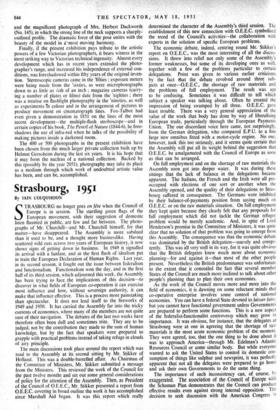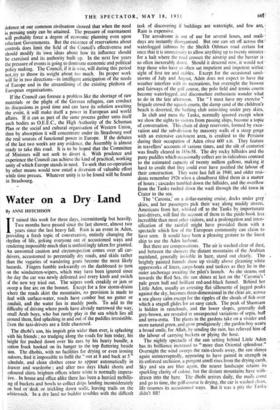Strasbourg, 1951
By IAIN COLTMOUN STRASBOURG no longer goes en fete when the Council of, Europe is in session. The startling green flags of the European movement, with their suggestion of domestic linen flaunted in public, are few and far between. The photo- graphs of Mr. Churchill—and Mr. Churchill himself, for that matter—have disappeared. The Assembly is more subdued than it used to be, and a thought more businesslike. Having scattered wild oats across two years of European history, it now shows signs of getting down to business. In 1949 it signalled its arrival with a fanfare, and in the first flush of idealism put in train the European Declaration of Human Rights. Last year, in its second session, it fought out the issue between federalism and functionalism. Functionalism won the day, and in the first half of its third session, which adjourned this week, the Assembly has been trying to face_ the implications of this decision—to discover in what fields of European co-operation it can exercise most influence and how, without sovereign authority, it can make that influence effective. This is a process more painstaking than spectacular. It does not lend itself to the fireworks of 1949 and 1950. It has carried the Assembly far into the tricky currents of economics, where many of the members are not quite sure of their navigation. The debates of the last two weeks have therefore often been dull and sometimes trite. They are to be judged, not by the contribution they made to the sum of human knowledge, but by the fact that speakers were .prepared to grapple with practical problems instead of taking refuge in clouds of airy principle.
The main discussions took place around the report which was read to the Assembly at its second sitting by Mr. Stikker of Holland. This was a double-barrelled affair. As Chairman of the Committee of Ministers. Mr. Stikker submitted a message from the Ministers. This reviewed- the work of the Council for the past twelve months and set out some general considerations of policy for the attention of the Assembly. Then, as President of the Council of O.E.E.C., Mr. Stikker presented a report from O.E.E.C. covering in broad outline the work it has accomplished since Marshall Aid began. It was this report which really determined the character of the Assembly's third session. The establishment of this new connection with O.E.E.C. symbolised the trend of the Council's activities—the collaboration with experts in the solution of specific European problems.
The economic debate, indeed, centring round Mr. Stikker's report on O.E.E.C., was the most interesting of all the discus- sions. It threw into relief not only some of the Assembly's former weaknesses, but some of its developing ones as well, together with a few of the problems particular to certain delegations. Point was given to various earlier criticisms by the fact that the debate revolved around three sub- jects at once—O.E.E.C., the shortage of raw materials and the problems of full employment. The result was apt to be confusing. Sometimes it was difficult to tell which subject a speaker was talking about. Often he created the impression of being swamped by all three. O.E.E.C. gave least trouble. There was a very general appreciation of the value of the work that body has done by way of liberalising European trade, particularly through the European Payments Union. The one discordant voice here came, not surprisingly. from the German delegation, who compared E.P.U. to a fine large new omnibus fitted with a motor-cycle engine. No one. however, took this too seriously, and it seems quite certain that the Assembly will put all its weight behind the suggestion that O.E.E.C. be amalgamated with the Council of Europe as soon as that can be arranged. On full employment and on the shortage of raw materials the Assembly soon got into deeper water. It was during these sittings that the lack of balance in the delegations became apparent. The Italians, the French and the Irish were all pre- occupied with elections of one sort or another when the Assembly opened, and the quality of their delegations to Stras- bourg suffered in consequence. The Germans were inhibited by their balance-of-payments position from saying much on O.E.E.C. or on the raw materials situation. On full employment they kept quiet because they clearly felt that any proposals fot full employment which did not -tackle the German refugee problem would be merely academic. And, in spite of Lord Henderson's promise in the Committee of Ministers, it was quite clear that no solution of that problem was going to emerge from this Assembly. The consequence was that the economic debate was dominated by the British delegation—suavely and compe- tently. This was all very well in its way, for it was quite obvious that the British delegates knew much more about economic planning—for and against it—than most of the other people present. Nevertheless the British predominance was unfortunate to the extent that it concealed the fact that several member States of the Council are much more inclined to talk about other people's planning than to plan their own economies. .As the work of the Council moves more and more into the field of economics, it is dawning on some reluctant minds that co-operative enterprise involves some control of national economies. You can have a federal State devoted to laisser faire. but you cannot have functional government unless Governments are prepared to perform some functions. This is a new aspect of the federalist-functionalist controversy which may grow in importance. It was obvious, for instance, that the delegates at Strasbourg were at one in agreeing that the shortage of raw materials is the most acute economic problem of the moment. They were agreed, too, that the one thing to be done about it was to approach America—through Mr. Edelman's Atlantic Resources Council or some similar body. But while everyone wanted to ask the United States to control its domestic con- sumption of things like sulphur and newsprint, it was perfectly apparent that not all the delegates were prepared to go home and ask their own Governments to do the same thing, The importance of such inconsistency can, of course. be exaggerated. The association of the Council of Europe with the Schuman Plan demonstrates that the Council can produce effective results even against strong internal opposition. The decision to seek discussion with the American Congress in defence or our common civilisation showed that when the need is pressing unity can be attained. The pressure of rearmament will probably force a degree of economic planning even upon reluctant Governments. But the existence of reservations about controls does limit the field of the Council's effectiveness and should modify its 'own ideas about how its influence should be exercised and its authority built up. In the next few years the pressure of events is going to dominate economic and political policy making. The Council, if it is wise, will during this period not.try to throw its weight about too much. Its proper work will lie in two directions—in intelligent anticipation of the needs of Europe and in the streamlining of the existing plethora of European organisations.
Irthe Council can foresee a problem like the shortage of raw materials or the plight of the German refugees. can conduct its discussions in good time and can have its solution awaiting the event, it will make itself a power in European and world affairs. If it can as part of the same process gather unto itself such bodies as O.E.E.C., the High Authority of the Schuman Plan or the social and cultural organisation of Western Union, then by absorption it will concentrate under its Strasbourg roof the real sources of functional power in Europe. If the debates of the last two weeks are any evidence. the Assembly is almost ready to take this road. It is to be hoped that the Committee of Ministers will not seek to divert it. With prudence and experience the Cduncil can achieve the kind of practical, working unity of which Europe stands in need. To seek that co-operation by other means would now entail a diversion of valuable effort while time presses. Whatever unity is to be found will be found in Strasbourg.







































 Previous page
Previous page